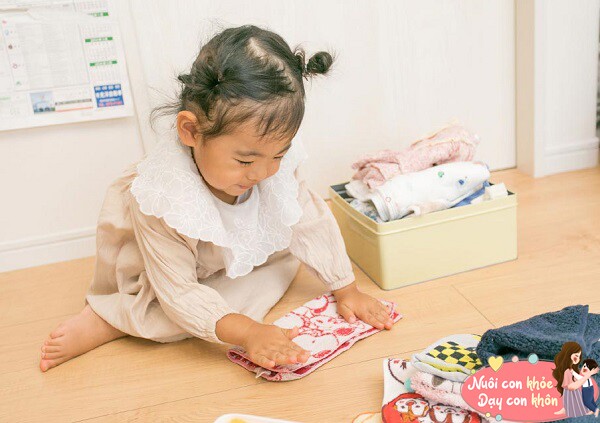When a child makes a decision, parental interference or criticism can lead to feelings of discouragement and self-doubt. Over time, the child may become hesitant to make choices, fearing blame or responsibility, or believing that their parents no longer love them.
According to psychologist Wu Zhihong, “The meaning of life lies in our choices. Only by continuously making choices for ourselves can we be considered truly alive. On the contrary, if our life is always chosen by others, it is considered a wasted life.”
Here are four important tips for parents to raise confident and independent children:


Allow Children to Do Things on Their Own
Psychologists advise treating children as independent individuals. Many parents unconsciously believe that children are weak and incapable of doing things by themselves. In reality, children’s capabilities can often exceed our imagination.
Therefore, parents should change their mindset and allow children to take ownership of their tasks, even if they don’t do them perfectly at first. With proper guidance, they will improve and develop their skills.
For example, if a child is curious and wants to imitate their mother’s way of washing socks, the mother should not assume that the child cannot do it properly and take over the task. This would inadvertently take away the child’s initiative.
Children may gradually lose their initiative, even for small tasks, and start lacking their own opinions. This is often closely related to parents’ unfounded doubts about their children’s abilities.
To show love for children in the right way, parents should learn to let go and allow them to try and do things on their own.

Allow children to do things on their own.

Encourage Children to Express Themselves Confidently
When children express their needs, it shows that they have the courage to speak up. This is an important step in their personal development, building self-confidence, and improving communication skills. Throughout the week, parents can guide children to express their true inner needs.
In different situations, encourage children to voice their opinions and views, helping them gain confidence in their expression. For example, when children participate in group activities or classroom discussions, parents can ask if they have any ideas or contributions.
When children are willing to try to express themselves, parents should offer encouragement and support. Create opportunities for them to engage in community activities, clubs, or presentations where they can practice their communication skills in a natural setting.
Even if their expression is not yet fluent or appropriate, provide positive feedback so they feel that their efforts are recognized. Positive feedback will motivate them to continue trying and reduce hesitancy in future conversations.

Encourage children to express themselves confidently.

Offer Children Appropriate Choices
Giving children the “power” to think independently and make their own choices helps foster initiative, confidence, and a sense of responsibility.
Through repeated choices, children learn what they like and what they are good at, gaining a deeper understanding of themselves.
They realize that some tasks must be completed even if they don’t want to, but they can choose when and how to complete them, making the process more enjoyable and learning to be flexible and proactive.
When a child understands what is within their control and what they are responsible for, they develop a sense of boundaries and accountability.
These small choices shape a child who is responsible, confident, and proactive.
Even if they make a wrong choice, they can learn from their mistakes. This type of life experience is more effective than any lecture a parent could give.
Let children understand that it’s important to be themselves.

Offer children appropriate choices.
Allow Children to Argue with Parents
Parents should create an open environment where children can think, discuss, and explore ideas from their perspective. Discussions should be non-judgmental.
Children should be allowed to argue with their parents appropriately. Children are not as unreasonable as we might imagine. When treated with respect and involved in problem-solving, children will actively cooperate, consider the information provided by their parents, and ultimately make the right choices.
Through this process, children learn to weigh the pros and cons. The more they experience this, the clearer they will become about their likes, wants, and intentions.
Parents should be patient, trusting, and supportive, protecting their children with love, involving them in decision-making, and encouraging self-expression. Developing independent thinking skills often requires parental guidance.
By thinking and daring to express themselves, children will develop their own opinions and not be at a loss when faced with life’s challenges.
Nurturing Talented and Resilient Children: 3 Types of Admirable Mothers We Should Emulate
Parenting is a challenging yet rewarding journey, and every parent aspires to raise their children to be resilient, capable individuals who can overcome life’s adversities. Nurturing a child’s potential and equipping them with the skills to navigate obstacles is the ultimate goal, fostering their growth into confident and accomplished adults.

































![[VIDEO] Life Hack: Save Money on Dish Soap with this Simple Trick](https://meo.tips/wp-content/uploads/2023/12/nuocruabattutraitac2_CNYB-100x70.jpg)



